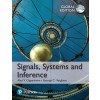Preface
The Cover
Acknowledgments
Prologue
1. Signals and Systems
1.1 Signals, Systems, Models, and Properties
1.1.1 System Properties
1.2 Linear, Time-Invariant Systems
1.2.1 Impulse-Response Representation of LTI Systems
1.2.2 Eigenfunction and Transform Representation of LTI Systems
1.2.3 Fourier Transforms
1.3 Deterministic Signals and Their Fourier Transforms
1.3.1 Signal Classes and Their Fourier Transforms
1.3.2 Parseval’s Identity, Energy Spectral Density, and Deterministic Autocorrelation
1.4 Bilateral Laplace and Z-Transforms
1.4.1 The Bilateral z-Transform
1.4.2 The Bilateral Laplace Transform
1.5 Discrete-Time Processing of Continuous-Time Signals
1.5.1 Basic Structure for DT Processing of CT Signals
1.5.2 DT Filtering and Overall CT Response
1.5.3 Nonideal D/C Converters
1.6 Further Reading
Problems
Basic Problems
Advanced Problems
Extension Problems
2. Amplitude, Phase, and Group Delay
2.1 Fourier Transform Magnitude and Phase
2.2 Group Delay and the Effect of Nonlinear Phase
2.2.1 Narrowband Input Signals
2.2.2 Broadband Input Signals
2.3 All-Pass and Minimum-Phase Systems
2.3.1 All-Pass Systems
2.3.2 Minimum-Phase Systems
2.3.3 The Group Delay of Minimum-Phase Systems
2.4 Spectral Factorization
2.5 Further Reading
Problems
Basic Problems
Advanced Problems
Extension Problems
3. Pulse-Amplitude Modulation
3.1 Baseband Pulse-Amplitude Modulation
3.1.1 The Transmitted Signal
3.1.2 The Received Signal
3.1.3 Frequency-Domain Characterizations
3.1.4 Intersymbol Interference at the Receiver
3.2 Nyquist Pulses
3.3 Passband Pulse-Amplitude Modulation
3.3.1 Frequency-Shift Keying (FSK)
3.3.2 Phase-Shift Keying (PSK)
3.3.3 Quadrature-Amplitude Modulation (QAM)
3.4 Further Reading
Problems
Basic Problems
Advanced Problems
Extension Problems
4. State-Space Models
4.1 System Memory
4.2 Illustrative Examples
4.3 State-Space Models
4.3.1 DT State-Space Models
4.3.2 CT State-Space Models
4.3.3 Defining Properties of State-Space Models
4.4 State-Space Models from LTI Input-Output Models
4.5 Equilibria and Linearization of Nonlinear State-Space Models
4.5.1 Equilibrium
4.5.2 Linearization
4.6 Further Reading
Problems
Basic Problems
Advanced Problems
Extension Problems
5. LTI State-Space Models
5.1 Continuous-Time and Discrete-Time LTI Models
5.2 Zero-Input Response and Modal Representation
5.2.1 Undriven CT Systems
5.2.2 Undriven DT Systems
5.2.3 Asymptotic Stability of LTI Systems
5.3 General Response in Modal Coordinates
5.3.1 Driven CT Systems
5.3.2 Driven DT Systems
5.3.3 Similarity Transformations and Diagonalization
5.4 Transfer Functions, Hidden Modes, Reachability, and Observability
5.4.1 Input-State-Output Structure of CT Systems
5.4.2 Input-State-Output Structure of DT Systems
5.5 Further Reading
Problems
Basic Problems
Advanced Problems
Extension Problems
6. State Observers and State Feedback
6.1 Plant and Model
6.2 State Estimation and Observers
6.2.1 Real-Time Simulation
6.2.2 The State Observer
6.2.3 Observer Design
6.3 State Feedback Control
6.3.1 Open-Loop Control
6.3.2 Closed-Loop Control via LTI State Feedback
6.3.3 LTI State Feedback Design
6.4 Observer-Based Feedback Control
6.5 Further Reading
Problems
Basic Problems
Advanced Problems
Extension Problems
7. Probabilistic Models
7.1 The Basic Probability Model
7.2 Conditional Probability, Bayes’ Rule, and Independence
7.3 Random Variables
7.4 Probability Distributions
7.5 Jointly Distributed Random Variables
7.6 Expectations, Moments, and Variance
7.7 Correlation and Covariance for Bivariate Random Variables
7.8 A Vector-Space Interpretation of Correlation Properties
7.9 Further Reading
Problems
Basic Problems
Advanced Problems
Extension Problems
8. Estimation
8.1 Estimation of a Continuous Random Variable
8.2 From Estimates to the Estimator
8.2.1 Orthogonality
8.3 Linear Minimum Mean Square Error Estimation
8.3.1 Linear Estimation of One Random Variable from a Single Measurement of Another
8.3.2 Multiple Measurements
8.4 Further Reading
Problems
Basic Problems
Advanced Problems
Extension Problems
9. Hypothesis Testing
9.1 Binary Pulse-Amplitude Modulation in Noise
9.2 Hypothesis Testing with Minimum Error Probability
9.2.1 Deciding with Minimum Conditional Probability of Error
9.2.2 MAP Decision Rule for Minimum Overall Probability of Error
9.2.3 Hypothesis Testing in Coded Digital Communication
9.3 Binary Hypothesis Testing
9.3.1 False Alarm, Miss, and Detection
9.3.2 The Likelihood Ratio Test
9.3.3 Neyman-Pearson Decision Rule and Receiver Operating Characteristic
9.4 Minimum Risk Decisions
9.5 Further Reading
Problems
Basic Problems
Advanced Problems
Extension Problems
10. Random Processes
10.1 Definition and Examples of a Random Process
10.2 First- and Second-Moment Characterization of Random Processes
10.3 Stationarity
10.3.1 Strict-Sense Stationarity
10.3.2 Wide-Sense Stationarity
10.3.3 Some Properties of WSS Correlation and Covariance Functions
10.4 Ergodicity
10.5 Linear Estimation of Random Processes
10.5.1 Linear Prediction
10.5.2 Linear FIR Filtering
10.6 LTI Filtering of WSS Processes
10.7 Further Reading
Problems
Basic Problems
Advanced Problems
Extension Problems
11. Power Spectral Density
11.1 Spectral Distribution of Expected Instantaneous Power
11.1.1 Power Spectral Density
11.1.2 Fluctuation Spectral Density
11.1.3 Cross-Spectral Density
11.2 Expected Time-Averaged Power Spectrum and the Einstein-Wiener-Khinchin Theorem
11.3 Applications
11.3.1 Revealing Cyclic Components
11.3.2 Modeling Filters
11.3.3 Whitening Filters
11.3.4 Sampling Bandlimited Random Processes
11.4 Further Reading
Problems
Basic Problems
Advanced Problems
Extension Problems
12. Signal Estimation
12.1 LMMSE Estimation for Random Variables
12.2 FIR Wiener Filters
12.3 The Unconstrained DT Wiener Filter
12.4 Causal DT Wiener Filtering
12.5 Optimal Observers and Kalman Filtering
12.5.1 Causal Wiener Filtering of a Signal Corrupted by Additive Noise
12.5.2 Observer Implementation of the Wiener Filter
12.5.3 Optimal State Estimates and Kalman Filtering
12.6 Estimation of CT Signals
12.7 Further Reading
Problems
Basic Problems
Advanced Problems
Extension Problems
13. Signal Detection
13.1 Hypothesis Testing with Multiple Measurements
13.2 Detecting a Known Signal in I.I.D. Gaussian Noise
13.2.1 The Optimal Solution
13.2.2 Characterizing Performance
13.2.3 Matched Filtering
13.3 Extensions of Matched-Filter Detection
13.3.1 Infinite-Duration, Finite-Energy Signals
13.3.2 Maximizing SNR for Signal Detection in White Noise
13.3.3 Detection in Colored Noise
13.3.4 Continuous-Time Matched Filters
13.3.5 Matched Filtering and Nyquist Pulse Design
13.3.6 Unknown Arrival Time and Pulse Compression
13.4 Signal Discrimination in I.I.D. Gaussian Noise
13.5 Further Reading
Problems
Basic Problems
Advanced Problems
Extension Problems
Bibliography
Index

